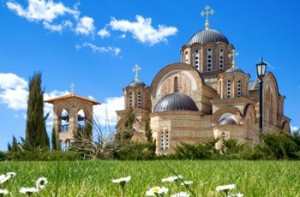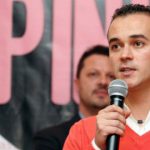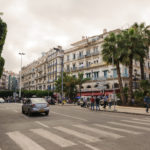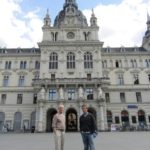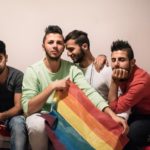The Scourge of Homosexuality
Serbia is in the throes of changing from a harsh war-torn society to a free-thinking free-enterprise nation of progress. Having suffered from its own aggressions as well Nato’s bombs in the 90’s there is little tolerance now for outside interference or for social experiments. Homosexuality is treated as a scourge with no legitimacy, no legal protections or cultural recognition. “Gay Life in Serbia” is an almost nonexistent scene. In all of Serbia there are only two known gay bars.
Compiled by Richard Ammon
GlobalGayz.com
March 2012
The following story was taken from the Belgrade Labris Lesbian web site:
http://www.labris.org.rs/en/
Lost Hope
Gay and lesbian existence in Serbia is mostly based on leading a double-life. Gays and lesbians live in complete isolation and silence. There are only few activists who are brave to speak openly in public or on television. Being an out lesbian or gay is a perilous social phenomenon in Serbia.
There are people who even think that being gay or lesbian is something imported from the West, something that spoils Serbian youth. During Slobodan Milosevic’s totalitarian regime gays were explicitly on the list of so-called enemies of the state and that some homosexual lobbies “collaborate” against the government. Lesbian and gay groups were not allowed to register, without any explanation, though the law didn’t ban it.
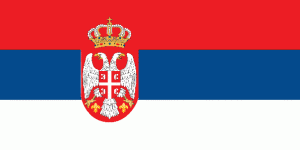 When we finally elected democratic government, we hoped that our rights would be taken into consideration. What we got after violently stopped parade was the silence of state officials. “There were politicians who had said that our society was still not used to put up with “that kind of deviance”. Some politicians are afraid that they’d be branded as gay if they were in favor of LGBT rights. (photo left: Serbian flag)
When we finally elected democratic government, we hoped that our rights would be taken into consideration. What we got after violently stopped parade was the silence of state officials. “There were politicians who had said that our society was still not used to put up with “that kind of deviance”. Some politicians are afraid that they’d be branded as gay if they were in favor of LGBT rights. (photo left: Serbian flag)
What they don’t understand is that this is our only life. In Serbia, everything that is marked as gay or lesbian loses its value. Politicians are afraid that they would not be taken seriously if they promote LGBT rights. There is no space in which gays and lesbians could see themselves as positive persons.
Misunderstood Sexuality
The situation is even more difficult in smaller towns where lesbians/gays cannot openly say who they really are. There is no political language that would give space for LGBT rights or civil society to reopen these questions. Therefore we work on anti-discriminative law that would secure the rights of people with different sexual orientation in one of its articles.”- explains Lepa Mladjenovic, one of co-founders of Labris, a radical feminist lesbian and the first open lesbian who discussed gay/lesbian issues on several Serbian televisions. “The nationalists say- we don’t care what you do in your bedrooms, just don’t come out in the streets. The point is that we don’t exist only in our bedrooms.”
For her work in Serbia on behalf of gay and lesbian rights and in the women’s and peace movements, Lepa received the Felipe de Souza award from the IGLHRC in 1994.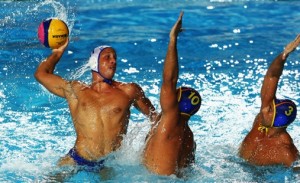
“ The problem in the treatment of homosexuality is the very fact that they don’t want to be normal,” says Jovo Tosevski, an influential Serbian sexologist in one of nationalist Serbian newspaper.
(photo right: Serbia is a world class water polo country)
“Heterosexual doctors claim that the solution for the discrimination of LGBT population is to place them within the sphere of privacy, invisibility, violence, hatred, lynch and isolation. It is incredible with how much self-assurance they claim that lesbian and gay existence “belongs to private life by nature”. I believe that there are more people of the same opinion, especially those who have beaten up the citizens who, according to them, looked like lesbians or gays on 30th June in Belgrade”, explained Lepa.
Apart from leading double-lives gays and lesbians in Serbia do not have the benefits of marriage, are not safe at their workplace, and live in constant fear and pressure. If their sexual orientation becomes known, they’re usually harassed by their families or at work or may even get fired.
Risky LGBT Scene
Yugoslavia has two gay clubs, one in the capital Belgrade and one in Novi Sad, in the more liberal Vojvodina province. Recently, in Novi Sad, some members of Obraz (ultra-nationalist group that openly promotes violence against LGBT people) or skinheads (you cannot tell them apart anymore) have broken into the club and severely beaten up all who found themselves there.
In the one in Belgrade, from time to time a group of skinheads circles around and watches who comes out of the club. One night, some gay friends of mine just went out to buy cigarettes and ended up in hospital. The police car just passed them by.
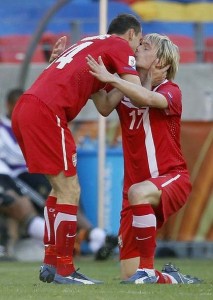 The recent news is that that the president of Yugoslavia and a candidate for president of Serbia, Vojislav Kostunica has begun his campaign for the second turn of presidential elections. He didn’t make any statements regarding the violence of June 30th and recently while visiting Columbia university and asked to give his opinion about LGBT rights and being reminded that Belgrade was the only town in the world where people got beaten up during pride parades, he exclaimed that he had more important things to deal with. (photo left: soccer comaraderie goes all out)
The recent news is that that the president of Yugoslavia and a candidate for president of Serbia, Vojislav Kostunica has begun his campaign for the second turn of presidential elections. He didn’t make any statements regarding the violence of June 30th and recently while visiting Columbia university and asked to give his opinion about LGBT rights and being reminded that Belgrade was the only town in the world where people got beaten up during pride parades, he exclaimed that he had more important things to deal with. (photo left: soccer comaraderie goes all out)
Celebrities’ are calling the citizens to vote for Kostunica and one of them is Nikola Hadzi Nikolic singer of rock group 357. He was one of the homophobic hooligans who has beaten and insulted gays and lesbians on the first Belgrade gay parade on June 30 2001. Will the harassment of LGBT continue or are we to face something worse?
Need for Change
In general spirit and dedication to accepting the European democratic values and institutions, our society must re-define its position when it comes to LGBT rights and identities. We are facing an enormous and difficult task in the atmosphere of strong homophobia and prejudice, to work and act on affirmation and articulation of LGBT identities and facilitate its wider social expression, without discrimination and direct violence, which we all unfortunately witnessed; and every kind of support would be by all means significant for us.
During the years of Slobodan Milosevic’s totalitarian regime, the pressure on civil society was considerable. And all of the NGO’s were seen as pro-western, anti-Serbian, anti-patriotic and therefore as traitors. For that reason gay and lesbian groups were not allowed to register. Hate speech and homophobia were present in the pro-regime media.
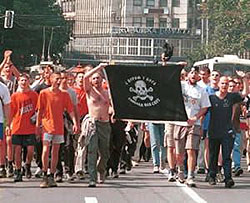 Mob going to attack Gay Pride March 2001 Mob going to attack Gay Pride March 2001 |
The political changes that took place still don’t allow much space for LGBT human rights. During this year nationalist and religious groups and individuals continued to publicly threaten LGBT individuals, while using hate speech in the media and giving homophobic statements.
There have also been several physical attacks on LGBT people. Political parties, the government of FR Yugoslavia and of the Republic of Serbia have not taken an official stance regarding the violation of the basic human rights of LGBT people.
New Strategies for Labris
Considering the current political and social situation in FR Yugoslavia, Labris believes it is best that we find our strengths in intensifying cooperation with regional like-minded groups, in order to strengthen LGBT identities, allow for the formation of new LGBT rights groups, promote LGBT rights and identify discrimination and violence against LGBT people, by conducting the “Education of Women’s Groups” and “Gay and Lesbian Media Campaign” projects.
About Labris
Gay and lesbian activism in FR (former) Yugoslavia officially began in the early nineties when Arkadija, a gay and lesbian organization, was formed. By the mid nineties Labris, an exclusively lesbian group, established itself apart from Arkadija.
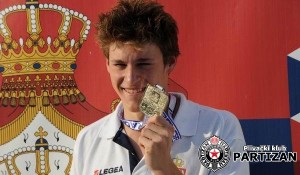 Labris is a group working on the promotion of lesbian human rights since 1995. At that time Labris organized its activities from the spaces of various women’s groups.
Labris is a group working on the promotion of lesbian human rights since 1995. At that time Labris organized its activities from the spaces of various women’s groups.
Labris has had its own space only since February of 2001 and having that space has been a tremendous help regarding the quality and realization of projects and activities. Our work is based on feminist ethical principles (no hierarchy, solidarity, no discrimination, transparency, non-violent communication…) (photo right: Serb swim champion Velimir Stjepanovich)
We chiefly empower lesbians to accept their identity and leave situations of discrimination and violence. Through organizing psychological and creative workshops, trainings, seminars, and cultural and educational programs: evenings of poetry, music, film, concerts and a theatre performance, Labris is for most lesbians the only contact with their community. We also organize educational lectures about lesbian/gay and women’s rights.
Our video collection contains about 50 movies and documentaries and our library contains more than 500 books and magazines in Serbian, Croatian, Slovenian, English, Italian, French, and Spanish… In 2001 we had two exhibitions of lesbian paintings and photographs (one of them was Lesbian Conexxions exhibition, as a part of our Pride celebration, in the Students Cultural Center which lasted five days). By means of our information center, printed materials (Labris has its own newspaper, the only one which deals with lesbian issues in Serbia), we support lesbians who live outside Belgrade as well.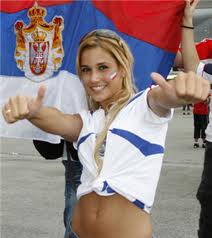
This year our activists were in Croatia and Slovenia to support their first pride parades. This year also, in Cologne, the Christopher Street Day organizers gave the Euro Pride Award to the organizers of Belgrade’s first pride parade. (photo left: Serbian athlete)
Representatives of Gayten-LGBT and Labris, the two groups that organized the Pride parade, received the award and gave a short speech, which was greeted by a cheering crowd. The mass of about 300,000 whistled to condemn the violence that took place last year in Belgrade.
To remind, in 2001 Labris, in cooperation with Gayten-LGBT and with the support of some gay and lesbian groups, organized the first gay and lesbian Pride Parade in Serbia, titled “There is Space for All of Us”. What was supposed to be a celebration of diversity on the main square in Belgrade on June 30th, 2001, became a field of violence. Participants of our parade, NGO representatives, individuals and passers-by were attacked and beaten by a thousand members of nationalist or religious pro-fascistic groups. With that the parade was violently broken up and 40 civilians were injured. Most of the media in FR Yugoslavia declared this to be the most drastic example of human rights violation in the country during that year, as did Amnesty International in its yearly report on Yugoslavia.
A good background report about modern Serbia can be read at: http://www.gradnet.de/papers/pomo2.archives/pomo01.paper/Drazovic01.htm
Also see: http://www.zinfo.hr/indoc/OdabirGrupeW.asp?OdabranaGrupa=21

